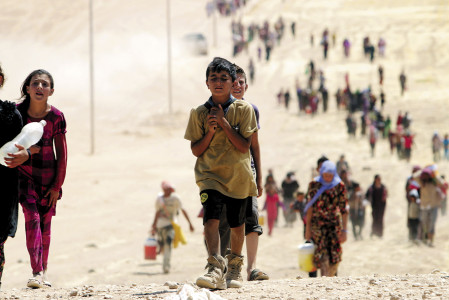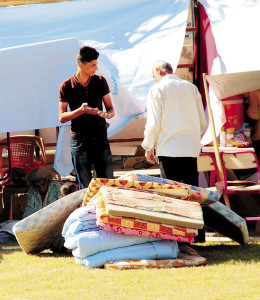BALTIMORE – Catholic Relief Services (CRS) has committed an initial $1 million in private funding to help victims of the escalating violence in northern Iraq. With the help of service partners in Iraq, CRS is currently providing food, water and essential living supplies to families in desperate need of the essentials.
Over the next six months, CRS hopes to more than double the initial $1 million commitment and help an additional 30,000 people with social support and trauma counseling, education for children and preparation for longer-term resettlement. The Diocese of Jackson will take up a collection the weekend of Sept. 27-28, to help Catholic agencies in the Middle East assist with humanitarian aid.

Children flee violence from forces loyal to the Islamic State in Sinjar, Iraq, Aug. 10. Islamic State militants have killed at least 500 Yezidi ethnic minorities, an Iraqi human rights minister said. (CNS photo/Rodi Said, Reuters)
CRS worker Caroline Brennan filed the following report from a refugee camp in Erbil, Iraq:
The news from Iraq can be terrifying from a distance. But up close and in person, Iraqi families could not be more gracious, welcoming and kind — despite the dire backdrop in which they are living.
In a tent where the heat is sweltering and water is in scarce supply, you are offered a bottle of cold water. Under an open sky where a family — who lived in a nice home less than a month ago, and today lives under a tree — you are graciously offered tea. Above all, you are offered apologies that they are not able to offer you anything more.
The humanitarian crisis facing Iraqi families here is something that was unimaginable for many of them just months ago. Since January of this year, 1.2 million Iraqis have been displaced within their country. They come from diverse backgrounds — Christian, Yazidi, and Shia minorities; corporate jobs, farmers and day laborers; grandparents, college students and newborns. They have one thing in common: they have been targeted by the militant group the Islamic State (also known as ISIS), and have fled their homes in fear.
Many left in the middle of the night at a moment’s notice, crowded into small cars with a large number of family members, fleeing for safer cities like Erbil and Dohuk. They made it to some form of refuge after being robbed at check points and walking for hours or days. They find themselves in a life completely foreign to what they knew before.
Local Iraqi priests say all are welcome here for refuge, but their resources are stretched thin. CRS is working with the local Catholic Church and Caritas Iraq to provide relief and care for thousands in the area. To date, Caritas Iraq and CRS have provided living supplies to 4,350 displaced families in Erbil, Ninewa, Dahuk, Zakho and Amedi. But the needs are tremendous.

Displaced people stand outside their tent at St. Joseph Chaldean Catholic Church in Ankawa, Iraq, Aug. 14. (CNS photo/courtesy Aid to the Church in Need-USA)
Fear looms for families who are uncertain what their options will be for the long term. For starters: School is to start in September, but tens of thousands of people have filled classrooms of school buildings that were closed for the summer. Many displaced children weren’t able to take their end of year exams back home so are uncertain they will be able to move up whenever schools do resume. It’s unclear when schools will reopen and, if so, where these families will go.
“We need to go to back to our homes. We want to be safe. We want to be able to go to Church,” says Mary, who now lives in a classroom with another family in Sarsang.
And, driving along the highways, you see hundreds of families, primarily Yazidi, living under overpasses or along the sides of the road.
No matter the backdrop, you are still welcomed with kindness, and offered what little families have from their abundance of their generosity.
“I don’t want you to feel sorry for me,” said Saddam, living in an abandoned building with his six children in Erbil. “I don’t want to hurt your heart. I’m sorry you are meeting me in this circumstance. This is not life, but we are breathing,” he says.
CRS and Caritas are opening a joint office in Erbil as a base for their expanding operations. Program priorities include: Food and shelter; water and sanitation; essential living supplies; psychological and social support; education for the thousands of internally displaced children who have missed months of school; and preparation for longer-term resettlement, including more permanent shelter and livelihood options, such as cash-for-work and vocational training.
(Copyright © 2014 Catholic News Service/United States Conference of Catholic Bishops. The CNS news services may not be published, broadcast, rewritten or otherwise distributed, including but not limited to, such means as framing or any other digital copying or distribution method in whole or in part, without prior written authority of Catholic News Service.)
